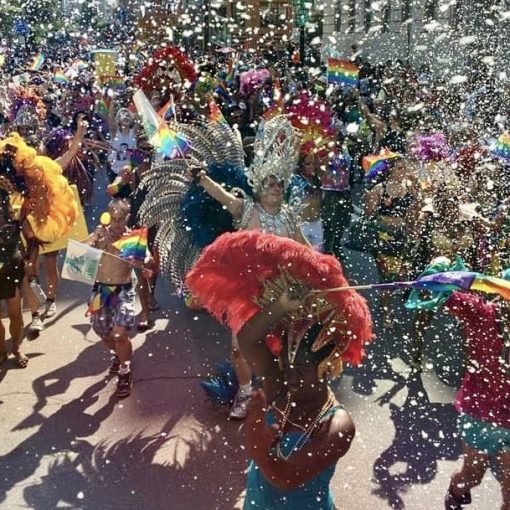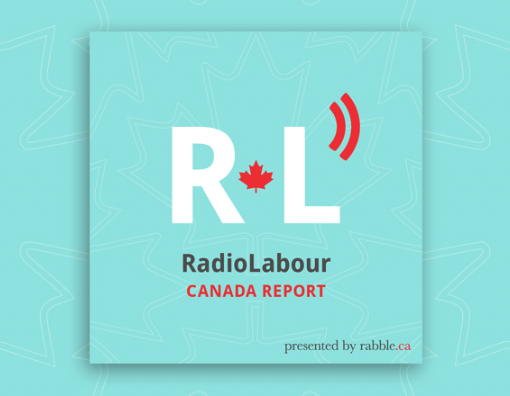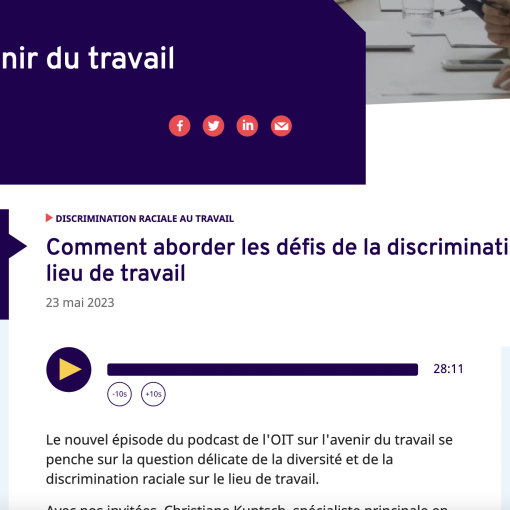We’re publishing here the letter that served as the basis for the article published on CULT. Not because the article is inadequate (it’s an excellent one) but because we want to multiply our discourse on the subject and leave a record, as complete as possible, of our positions. We also want to create and manage our own archive of our struggles.
Intersectionality has been very fashionable in recent years, but increasingly depoliticized. And rarely used to discuss concrete cases of interweaving power relations and the people who are particularly victimized by them. The realities of Black LGBTQ+ communities are concretely about intersectionality. These are multiple systems of power, complex and fluid, which create unprecedented situations of violence. What’s happening with Afropride is yet another example.
First of all, yes, it’s obvious that we’re seeing a resurgence of hatred towards the LGBTQ+ community. With the rise to power of extremist groups, incumbent politicians surfing on the crassness of populism to keep themselves in power, and historically the fact that we’ve entered a period of backlash following advances in social justice: this context can’t be ignored.
However, I’d just like to temper the idea that we’re leaving behind a golden era for LGBTQ+ communities. It’s true that over the last few decades we’ve seen several legal gains for these communities, as well as improvements in terms of public acceptance and mainstream representation. But these rights have above all benefited the most privileged members of the community. Privileged by their gender, their conformity to social norms in terms of how they make couples, privileged by their racial affiliation, their social status, their cis-identity and so on.
To put it another way, these rights and advances have not benefited so globally black LGBTQ+ people, immigrants, poor people, sex workers, trans people… The current backlash is visible because it now also affects those who had won rights and now see themselves once again in danger. Just so we don’t paint too homogenous a picture of recent decades. And also because we need to understand that within the LGBTQ+ milieu there are also power relationships to be taken into account.
That’s why Afropride and other organizations in racialized communities are so important. If you look at the fabric formed by LGBTQ+ community advocacy organizations in Quebec, it’s still racially very homogeneous. There’s very little representation of black people, for example, and therefore very little consideration of our experiences and the specificities of our struggles. It’s also important to understand that racial discrimination also exists within the LGBTQ+ community, and it’s very difficult to address it, let alone denounce it. Especially in a region where we’re still arguing that systemic racism exists.
It is indeed very difficult to address that homophobia and transphobia also exist within the Black community. Lets be careful not to portray the Black community as being more homophobic or more exclusive than others – or to make it into something cultural. It’s a complex subject, because to understand it, we need to talk about colonial history. About how our communities are still suffering the consequences of European colonization – in multiple ways and in extremely complex ways. But particularly in the rejection of queer identities.
For example, we know that colonization brought a set of values and worked particularly hard to demonize the panorama of gender identity and sexual orientation. We’re still fighting the consequences of this. Another example, there is a belief that homosexuality is a “white man’s disease”: a perversion brought to African populations by the colonists. The work of Charles Gueboguo, among others, sets out to dismantle this fiction by tracing the existence of non-heteronormative vocabulary in pre-colonial languages. Nevertheless, the notion of homosexuality as a “white man’s practice” is still widespread. Sexual and/or gender non-normativity becomes symbolic of non-membership of the black community. One is exclusive to the other. We can talk a lot about all that.
On the other hand, the LGBTQ+ community has long (and unfortunately still does) worked to construct the gay subject as a white subject. The failure to take racial experience into account works to construct a gay subject that is “raceless” and therefore white. When I talk about intersectionality, it’s really to illustrate all this. Afropride finds itself suffering the fallout of a huge amount of violence played out against us. On the one hand, there’s the cancellation of Carifiesta, which is extremely insulting and politically fraught for Black, immigrant and Caribbean communities, among others. But also, the fact that, for decades, we’ve been hammered with the idea that the LGBTQ+ community has an “agenda”, and that Afropride is proof of this agenda, but this time towards Black communities. The fact that, unfortunately, this ideology that being black is incompatible with being queer still circulate.
All in a context that’s even more tragically ridiculous than we speak of the carnival itself. Literally, if there’s ever a time, if there’s ever an event, when Black queer communities have the most opportunity to be visible and celebrated, it’s Carnival! Traditionally, it’s a time when codes and genders are overturned. It’s a time to make a mockery of convention: it’s carnival. So these attacks on Afropride are complete nonsense in terms of our traditions and culture.
There’s a lot more to write about this subject, and I’ve tried to give as broad an outline as possible. But it’s important to understand that what’s happening with Afropride is a micro-level manifestation of a macro-level power system.
That’s why when we created Harambec, as three black and queer people, we hammered home the fact that we work by and for black communities, including queer people. Because we are part of that community. What’s more, historically, queer black people have been at the forefront of multiple struggles against systems of discrimination. Because we were suffering all kinds of violence at the same time, and weren’t getting the right support from anyone. We want to show our solidarity with Afropride and denounce the violence they suffer, including intra-community violence. And as long as this type of behavior surfaces, this type of belief and this type of violence, we must be able to mobilize as a community to confront it.




